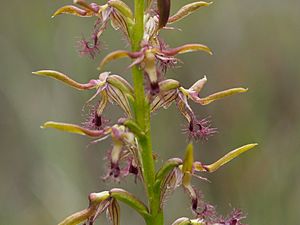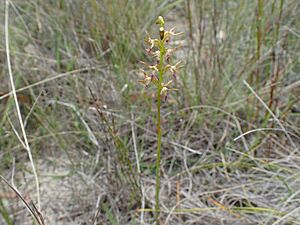Fringed midge orchid facts for kids
Quick facts for kids Fringed midge orchid |
|
|---|---|
 |
|
| Genoplesium fimbriatum in the Cathedral Rock National Park | |
| Scientific classification | |
| Genus: |
Genoplesium
|
| Species: |
fimbriatum
|
| Synonyms | |
|
|
The Fringed Midge Orchid (its scientific name is Genoplesium fimbriatum) is a tiny orchid that grows on the ground. You can find it in parts of southern Queensland and southern New South Wales, Australia. This special orchid has one thin leaf and can grow up to thirty flowers. These flowers are usually green to brownish-green with cool red stripes. They also have a special part called a labellum which is tipped with red and has fuzzy edges.
Contents
What the Fringed Midge Orchid Looks Like
The Fringed Midge Orchid is a plant that lives for many years. It grows from an underground tuber (like a small potato). It has one very thin leaf that can be about 20 to 35 centimetres (8 to 14 inches) long. A small part of the leaf, about 2 to 3 centimetres (1 inch) long, sticks out freely.
This orchid produces between five and thirty flowers on a stem. The stem usually grows about 5 to 10 centimetres (2 to 4 inches) tall. The flowers smell like lemons! They are green to brownish-green with red stripes. Each flower is about 12 millimetres (0.5 inches) long and 9 to 11 millimetres (0.35 to 0.43 inches) wide.
Flower Parts
Orchid flowers are a bit unique. In this type of orchid, the labellum (a special lip-like petal) is actually above the column (the central part of the flower), not below it.
- The dorsal sepal is egg-shaped. It is about 4 to 5 millimetres (0.16 to 0.20 inches) long and 2 to 3 millimetres (0.08 to 0.12 inches) wide. It has red stripes, a fuzzy edge, and a sharp tip.
- The lateral sepals are long and narrow. They are about 5 to 6 millimetres (0.20 to 0.24 inches) long and 1 to 1.5 millimetres (0.04 to 0.06 inches) wide. These sepals are separate from each other and spread out wide.
- The petals are egg-shaped and pointed. They are about 3 millimetres (0.12 inches) long and 1 millimetre (0.04 inches) wide. They also have stripes and long hairs on their edges.
- The labellum is a long, narrow part. It is about 4 millimetres (0.16 inches) long and 1 millimetre (0.04 inches) wide. Its red tip curls upwards, and it has long pink to red hairs on its edge. This labellum can even quiver (shake) in the slightest breeze!
The Fringed Midge Orchid usually flowers between December and May.
How the Fringed Midge Orchid Got Its Name
The Fringed Midge Orchid has had a few different names over the years!
First Description
The first time this orchid was officially described was in 1810. A botanist named Robert Brown gave it the name Prasophyllum fimbriatum. He wrote about it in a book called Prodromus Florae Novae Hollandiae et Insulae Van Diemen.
Name Changes
Later, in 1989, two other botanists, David Jones and Mark Clements, changed its name to Genoplesium fimbriatum. Then, in 2002, they tried to change it again to Corunastylis fimbriata. However, this last name change was not accepted by the group that keeps track of plant names worldwide. So, its accepted scientific name today is Genoplesium fimbriatum.
Meaning of the Name
The second part of its scientific name, fimbriatum, comes from a Latin word. It means "fringed" or "fibrous," which makes sense because of the orchid's hairy or fringed edges on its labellum and sepals!
Where the Fringed Midge Orchid Lives
The Fringed Midge Orchid grows in many different places. You can find it in open forests, heathlands (areas with small shrubs), and even in mossy gardens. It likes to live in areas close to the coast and on the nearby tablelands. These areas are between Stanthorpe in Queensland and Vincentia in New South Wales. This orchid often grows in places where wildfires happen often and where there is a good amount of rainfall.


